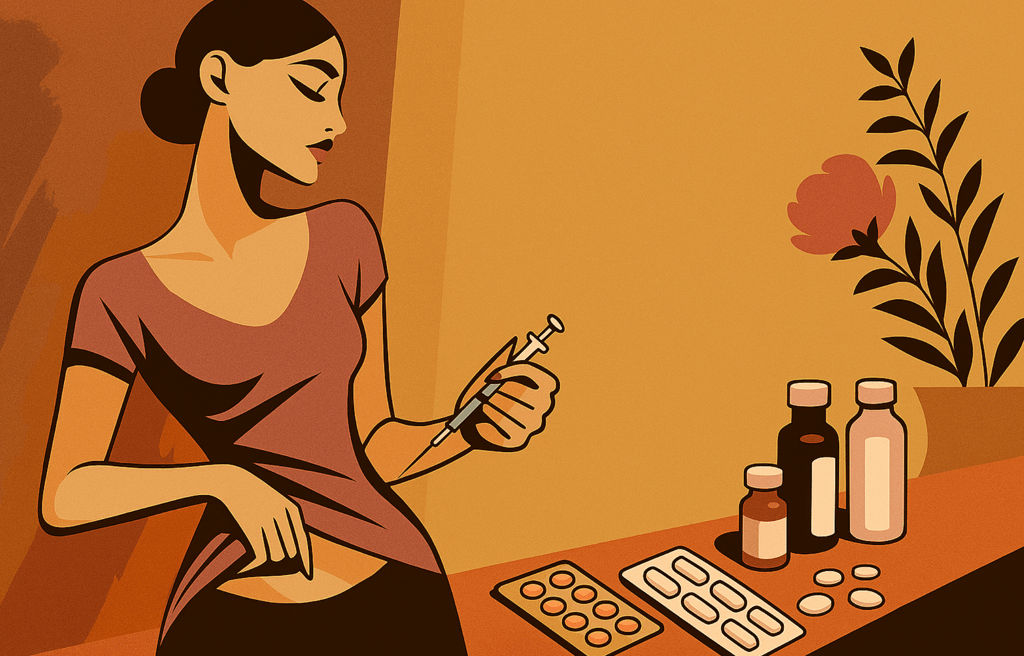IVF Medications: What They Do & Side Effects
A clear, UK-based guide to IVF medications: what each drug does, how it's taken (injection, spray, pessary), and the common side effects you might experience during each phase of treatment.


If you’re about to begin IVF, you’ve probably seen the list of medications — and felt completely overwhelmed. Injections? Hormones? Daily pills and nasal sprays?
This post is here to demystify it all.
We’ll walk you through each type of IVF medication, what it does, how it’s usually taken, and the side effects you mightexperience. This is a UK-focused guide written for real people — with both clarity and compassion.
📖 Read next: IVF Timeline: From Start to Finish
Why So Many Medications?
IVF treatment essentially takes over your natural reproductive system in a highly controlled way. That means replacing or boosting your body’s own hormone signals at just the right time — which requires multiple medications across several stages.
You won’t necessarily take all of the ones listed here. Your fertility clinic will personalise your protocol depending on your test results, age, egg reserve, medical history, and previous response to treatment.
1. Downregulation (Turning Off Your Cycle)
Used in some protocols (like the long protocol), downregulation stops your natural hormonal cycle so the clinic can control it from scratch.
Common Medications:
Nafarelin (Synarel) – nasal spray
Buserelin – injection or spray
Prostap / Zoladex – monthly depot injection
Norethisterone - tablets
What They Do:
Suppress ovulation
Prevent premature hormone surges
Temporarily mimic menopause
Side Effects:
Hot flushes
Headaches
Mood swings
Vaginal dryness
Sleep disturbances
📌 Not all IVF patients go through this step — it depends on your protocol.
2. Ovarian Stimulation (Making Multiple Eggs)
This is the heart of IVF: daily hormone injections to stimulate your ovaries to mature multiple eggs rather than just one.
Common Medications:
Gonal-F / Menopur / Bemfola / Fostimon / Pergoveris
(All contain FSH, sometimes with LH)
What They Do:
Stimulate the growth of multiple follicles (each containing an egg)
Mimic your body’s natural follicle-stimulating hormone (FSH)
How Taken:
Subcutaneous injections (usually into the stomach)
Once daily, typically for 8–14 days
Side Effects:
Bloating
Sore ovaries
Mood swings
Tiredness
Bruising at injection site
Risk of OHSS (Ovarian Hyperstimulation Syndrome)
3. Ovulation Blockers (Preventing Early Release)
Once your follicles start maturing, you’ll also need to prevent premature ovulation.
Common Medications:
Cetrotide
Orgalutran
What They Do:
Suppress LH surges to prevent eggs from being released before collection
Side Effects:
Mild skin reactions at the injection site
Headache
Rare allergic reactions
4. Trigger Shot (Final Egg Maturation)
This shot times ovulation precisely before egg collection.
Common Medications:
Ovitrelle (hCG)
Gonasi / Pregnyl (hCG)
Lupron / Buserelin (sometimes used instead for low OHSS risk)
What They Do:
Final maturation of eggs
Triggers ovulation exactly 36 hours before egg retrieval
Side Effects:
Abdominal tenderness
Bloating
Moodiness
Rare: mild OHSS if hCG is used and too many follicles respond
5. Progesterone (Luteal Phase Support)
After egg retrieval, your body may not produce enough progesterone on its own — so this is supplemented to support implantation.
Common Medications:
Cyclogest (pessaries)
Lubion (injection)
Crinone (gel)
What They Do:
Support the uterine lining
Help create a stable environment for the embryo to implant
Side Effects:
Bloating
Breast tenderness
Mood swings
Discharge (from pessaries)
Constipation
6. Other Medications You Might Be Given
Depending on your medical history, clinic preferences, and test results, you might also be prescribed:
Aspirin or Clexane – to support implantation
Prednisolone – steroid to reduce immune response
Thyroxine – for thyroid support
Metformin – for insulin regulation in PCOS
Oestrogen tablets or patches – to build uterine lining
Antibiotics – to prevent infection after procedures
These are usually tailored to your specific needs and explained clearly by your clinic.
Do the Injections Hurt?
Not as much as you think. Most IVF injections are tiny subcutaneous needles, designed to go just under the skin — not into the muscle. Many people say the anxiety is worse than the actual jab.
Tips to reduce discomfort:
Rotate injection sites
Let the alcohol wipe dry before injecting
Warm the vial (briefly) in your hand
Use ice after if needed
Emotional and Physical Side Effects
IVF medications don’t just affect your body — they can have a big emotional impact too. This is something we’re not always warned about, but it’s very real.
You might feel:
Moodier or more irritable
Anxious or tearful
Foggy or detached
Physically swollen or sore
Hormones affect the brain as much as the body. Be kind to yourself. Your emotional response is not a weakness — it’s a totally normal part of this process.
📖 Read next: Coping with IVF Side Effects
Every IVF protocol is slightly different — but the goal is always the same: to support your body in creating the best possible chance of pregnancy.
Medications can be intense, but they’re temporary. Knowing what to expect, and why each one matters, can help you feel more informed and in control.
© 2025. All rights reserved.
